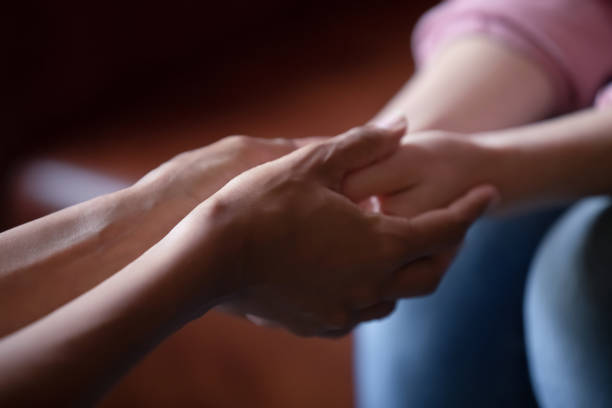Last Updated on November 1, 2022

Empathy is a term that is used to describe a wide range of emotions. Empathy is defined by emotion researchers as the ability to sense other people’s emotions as well as the ability to imagine what they are thinking or feeling.
Today’s scholars frequently distinguish between two types of empathy which are affective and cognitive empathy.
Have tears ever come to your eyes while watching a birthing video or do movies about kids with cancer make you cry? If so, you are exhibiting affective empathy. It refers to the sensations and feelings we have in response to other people’s emotions; this can entail matching what they’re feeling or simply feeling stressed when we notice someone else’s fear or anxiety (you should probably avoid horror movies).
“Cognitive empathy,” sometimes known as “perspective-taking,” is the ability to recognize and understand the feelings of others. For example, a friend of yours applied for a job and got called for an interview, only to be rejected at the end of the process. You are most likely to see and understand their disappointment, offer some encouraging words and maybe help out with the job searching.
Why is Kindness Often Seen as a Weakness?

Our inclination to equate empathy with weakness is considerably more pervasive than we would think. The perception that those who care for the mental and physical well-being of others are somehow emotionally “weak” – that to regard the wants and wishes of others is to somehow minimize your own value – lies beneath our reluctance to recognize kindness as a strength.
Empathetic people (especially affective empaths) are highly sensitive people who are acutely aware of the emotions of those around them and have the ability to perceive what others are thinking and feeling. They are extremely intuitive and possess a high level of emotional intelligence. They are the ideal friends who will always be there for you, listen to you, and care about you.
This all sounds fantastic, but there is a catch. All of their sensitivity could take a toll on them. They are experiencing what others are experiencing, and they are taking on the anguish, anxiety, and anger of their friends and loved ones. Setting healthy limits for themselves is a struggle and it is difficult for them to say no.
They are devoted to a fault, always putting the needs of others ahead of their own, and would cry uncontrollably when watching movies and reading literature. They cringe when they watch the news because they can’t stand seeing children, dogs, or anybody else who is weaker, less fortunate, or in a disadvantaged circumstance suffer from diseases, homelessness, or injustice. And they take immense delight in giving and assisting others simply because it makes them happy.
I think I’m getting carried away with describing how deep empaths feel but you get the point. With all this sensitivity and vulnerability, it is easy for people to place empaths as the “weak ones”. However, with the right amount of moderation, empaths can ensure that their biggest strength doesn’t become their biggest weakness.
The Right Way to Show Empathy

Don’t try to take on all the pain of others
You must continually remind yourself that you are alone responsible for your own life and happiness. While you can sense other people’s grief and struggle, and you do all you can to help, you must keep in mind there’s only so much you can do. You can assist them, advise them, and be there for them, but you can only assist someone who is willing to assist themselves. Be sure to remind yourself that you have no control over their suffering or recovery. You must understand that everyone has their own path to take and that growth frequently occurs as a result of hard events and situations. If you take on someone else’s load, it may or may not make their life easier, but it will almost certainly make yours more difficult.
Setting boundaries
The hardest thing for an empath to do is to establish a line between themselves and others in order to safeguard their own well-being. It’s difficult for the empath to say no to certain situations because helping and caring are just how they are by default.
As an empath, you must learn to establish clear boundaries and determine where you are being of assistance and where it is already sucking the life out of you. In order to practice self-care, you must learn to be a bit selfish in the most positive meaning of the word. If something doesn’t match your schedule, needs, or expectations, you must learn to say no.
Saying no isn’t disrespectful; it’s a way of teaching others about your needs and limits. It’s about instructing them how to treat you, and if they misinterpret it, that’s their problem, not yours. You have the right to say no to people who use you, your help, your time, or your energy for no reason.
Don’t try to save others at your expense
This one is for both you and the person you’re trying to save. On one hand, just because you believe someone needs to be saved does not mean they do. They may not be ready to be saved, and they cannot be fixed. They must take responsibility for their own healing and salvation. Imagine you have a loved one who just won’t give up smoking despite being diagnosed with lung cancer. You try to get them help, spend your money to put them in rehab, recommend AA groups for them to join and all that but the person just won’t quit!
Some people are wallowing in their sadness, and they will drain your energy and resources, revel in your attention, and appear to help when they really expect you to do all the effort. and that just isn’t healthy for you at all.
Sometimes, by trying to save people, you are depriving them of the crucial lessons that they must acquire on their own. Why should people bother learning to solve their own problems if their problems are magically fixed by someone else?
It is not your responsibility to fix, save, or take others out of their sorrow. The earlier you understand that, the better. Sure, you may support and stand by them as they try to save themselves, but that’s all you can do. You must understand that your worth is unrelated to your ability to assist and save others. Your gift is compassion, not a one-sided effort to save someone who refuses to be saved in the first place.
Final Thoughts
Being an empath is said to be a gift, but you must make sure that it is a gift for you as well as for others. Just as you would with a buddy, empathize with yourself. Make yourself a priority, be available to yourself, and take care of yourself.
The amount of love and care you have in you knows no bounds. Because you love and care for yourself, you’ll have even more to give to others — if your energy is high, if you’re not tired and frustrated from all the energy vampires who just take and take — you’ll be able to practice self-care for others who truly need it.
And that my friends are how to be empathetic without being or getting weak.
Before you go…
Hey, thank you for reading this blog to the end. I hope it was helpful. Let me tell you a little bit about Nicholas Idoko Technologies. We help businesses and companies build an online presence by developing web, mobile, desktop and blockchain applications.
As a company, we work with your budget in developing your ideas and projects beautifully and elegantly as well as participate in the growth of your business. We do a lot of freelance work in various sectors such as blockchain, booking, e-commerce, education, online games, voting and payments. Our ability to provide the needed resources to help clients develop their software packages for their targeted audience on schedule.
Be sure to contact us if you need our services! We are readily available.











